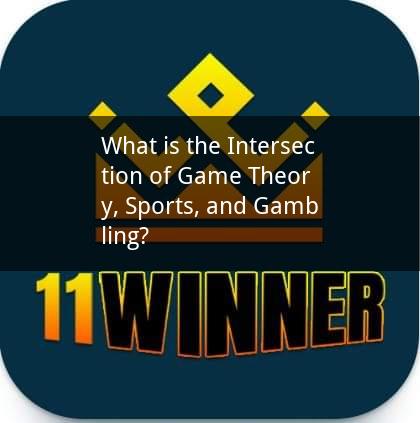
I. Introduction to Game Theory
In the realm of strategic decision-making, game theory stands as a cornerstone, offering insights into the behavior of individuals and groups in competitive scenarios. At its core, game theory is the study of interactions where the outcome for each participant depends on the actions of others. This theory has transcended its origins in economics and mathematics, finding its way into various fields, including sports and gambling.
II. The Dynamics of Sports
Sports, as a universal language, bring together people from all walks of life. The competitive nature of sports has always been a fertile ground for the application of game theory. Athletes, coaches, and even fans engage in a complex web of strategic interactions that can be analyzed through the lens of game theory.
2.1. Athlete vs. Athlete
Consider the classic scenario of a tennis match. Two players, each with their own strategies, are vying for victory. The use of game theory helps in understanding how players can anticipate and counter each other's moves. For instance, the concept of mixed strategies, where a player randomizes their moves to prevent the opponent from predicting their next move, is a testament to the strategic depth of sports.
2.2. Team vs. Team
In team sports, the complexity multiplies. Coaches must devise strategies that not only anticipate the opponent's moves but also account for the collective behavior of the team. The "hot hand" phenomenon, where players are believed to be on a streak and thus more likely to succeed, is a prime example of how psychological factors can be incorporated into game theory.
III. The World of Gambling
Gambling, with its inherent element of chance, seems to be an antithesis to the strategic nature of game theory. However, the world of gambling is rife with strategic decisions, making it an ideal subject for game theory analysis.
3.1. The Art of Betting
In sports gambling, bettors must weigh the probabilities of different outcomes and place their bets accordingly. The concept of expected value, a cornerstone of game theory, becomes crucial. Bettors must calculate the expected value of each bet and make informed decisions based on this analysis.
3.2. The House Edge
Casino games, with their predetermined odds, present a clear example of the house edge. Game theory helps gamblers understand the mathematical advantage that casinos hold and how to navigate these odds to their best advantage.
IV. The Interplay: Game Theory in Sports Gambling
The intersection of game theory, sports, and gambling is a complex and fascinating area. It involves not only the strategic decisions of athletes and gamblers but also the broader implications of these interactions on the sports industry and the gambling market.
4.1. The Evolution of Betting Markets
As game theory has been applied to sports gambling, betting markets have evolved. The use of data analytics and machine learning has allowed for more sophisticated odds and a wider range of betting options, creating a more dynamic and competitive market.
4.2. The Impact on Sports Integrity
The increased use of game theory in sports gambling has raised concerns about the integrity of sports. The temptation for athletes to engage in match-fixing or for gamblers to manipulate outcomes is a significant challenge that requires robust regulatory frameworks.
V. Case Studies: Real-World Applications
To better understand the application of game theory in sports and gambling, let's delve into a few case studies.
5.1. The NBA's Salary Cap
The NBA's salary cap is a prime example of game theory in action. Teams must strategize to sign the best players while remaining within the salary cap restrictions. The use of game theory helps teams anticipate the moves of their competitors and make informed decisions.
5.2. The Poker World
Poker, often referred to as the "thinking man's game," is a perfect example of game theory in practice. Players must read their opponents, predict their strategies, and adapt their own tactics accordingly. The game of poker has been a testing ground for game theory concepts for decades.
VI. Conclusion
The intersection of game theory, sports, and gambling is a rich area of study that offers valuable insights into human behavior and strategic decision-making. As these fields continue to evolve, the application of game theory is likely to become even more prevalent, shaping the way we view and engage with sports and gambling.
Questions and Answers
Q1: How does game theory help in predicting the outcome of a sports match?
A1: Game theory helps in predicting outcomes by analyzing the strategic decisions of players and teams. By understanding the probabilities of different moves and the potential responses from opponents, analysts can make more accurate predictions.
Q2: Can game theory be used to prevent match-fixing in sports?
A2: Yes, game theory can be used to detect patterns indicative of match-fixing. By analyzing the statistical anomalies and strategic inconsistencies that may arise from such activities, authorities can take appropriate action.
Q3: How does the application of game theory in sports gambling affect the betting market?
A3: The application of game theory in sports gambling has led to more sophisticated betting markets. This includes the use of advanced analytics and machine learning to create more accurate odds and a wider range of betting options.
Q4: What are the ethical implications of using game theory in sports?
A4: The ethical implications include the potential for manipulation and the need for transparency. It is crucial to ensure that the use of game theory in sports does not lead to unfair practices or undermine the integrity of the games.
Q5: How can game theory be used to improve the performance of athletes?
A5: Game theory can be used to improve athlete performance by helping them anticipate and counter their opponents' strategies. This can lead to better decision-making on the field and improved overall performance.